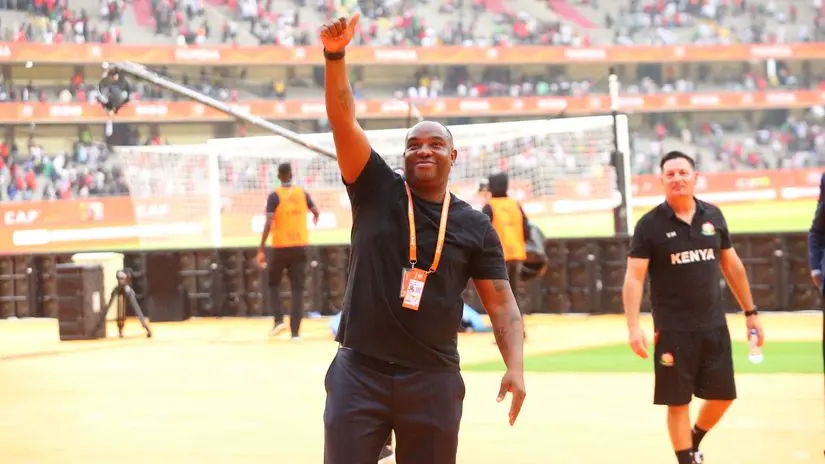CHAN 2024 has become the stage where Kenya’s Harambee Stars are discovering both resilience and identity under Benni McCarthy. An unbeaten start, a pair of statement wins over DR Congo and Morocco, and a gritty draw with Angola have not just lifted the team to the brink of the quarter finals, they have also showcased a coach imprinting clear ideas on a local-based squad in real time.
The unbeaten start and growing belief
Kenya opened with a 1-0 victory over two-time champions DR Congo at Kasarani, then drew 1-1 with Angola before stunning another two-time winner, Morocco, 1-0. The arc of those results matters, because the team had to manage pressure and game states the hard way, including playing with ten men against Angola and Morocco after red cards to Marvin Nabwire and Chrispine Erambo respectively. The group picture is bright, with Kenya needing at least a point against Zambia to advance, and the mood is one of measured belief.
Former Harambee Stars coach Jacob ‘Ghost’ Mulee distilled that belief into specifics. He praised how McCarthy reorganised on the fly when the cards came out, noting the shifts that stiffened Kenya’s backbone in each crisis. His verdict was that the coach understands his players, prepares for scenarios in training, and has raised standards in the process.
Tactics under pressure and how 10 men stayed calm
Siraj Mohammed, newly unveiled at Gor Mahia and a debutant against Morocco, offered the view from inside the fire. He credited McCarthy’s tactics for helping a ten-man Kenya stay composed, and he highlighted how the plan remained clear even as the match tempo surged.
“This is not the first red card because even against Angola, we were given a red card, but there is a strategy that the coach has given us, and we are following it and having an easy time on the pitch. The game was a positive one, the most important thing is that we scored early in the game.”
Siraj added that many doubted Kenya against Morocco, yet the group worked around the clock and proved those doubts wrong. He called the win a sign that the standards of Kenyan football are rising, a sentiment that resonates with the public mood after back to back results against tournament heavyweights.
Mulee’s analysis dovetails with that view, and he went further by detailing the in-game tweaks that closed the door. His remarks framed McCarthy as a coach who not only believes in his players but also arms them with structure.
“Those reds were unfortunate… however, with Benni, the way I saw it, the first red card, he reorganised the team in terms of tactics. He brought in Kibwage in the second half and played a 5-3-1 formation. Against Morocco, in the first half, he played 4-4-1, so it changes.”
He concluded that this is about belief and preparation, and that the man who has made Kenya what it is at this point is McCarthy. It is not flowery praise, it is a clear-eyed accounting of adjustments that win tense tournament minutes.
| CASINO | BONUS | INFO | RATING | |
|---|---|---|---|---|
|
bonus
Register for up to 31,400 KSH bonus on deposits!
See 12 Bonuses
|
info
No. ALSI-112310012-F15 Unique selection of slots & games |
|||
|
bonus
Sign up for KES 46 bonus after first deposit!
See 11 Bonuses
|
info
20+ crash & instant games, Aviator bonuses BK 0000704 |
|||
|
bonus
Welcome bonuses, free spins, and cashback await you!
See 4 Bonuses
|
info
Large welcome bonus, crypto-friendly, huge provider list. No. 1668/JAZ |
|||
|
bonus
50% welcome bonus up to KES 1,000
See 3 Bonuses
|
info
|
The rise of Ryan Ogam and a striker in the coach’s image
Tusker FC forward Ryan Ogam is a story within the story. Once a defensive midfielder, then a winger, he has blossomed into a centre forward with a ruthless streak. He was deployed wide against DR Congo, but restored to his natural role against Morocco he scored the decisive goal in the 1-0 win. That moment was a full-circle return from a meniscus tear suffered on Wednesday, 26 February in Tusker’s 1-1 draw with Shabana, an injury he initially thought minor before March surgery ruled him out for much of the run-in. He returned in June for Tusker’s final FKF Premier League match against Kakamega Homeboyz and still closed with 15 goals in 17 league appearances.
McCarthy, South Africa’s all-time top scorer, sees a template he knows well. The coach described Ogam as a work in progress after a nasty injury, praised the CHAN squad’s patience with his recovery, and forecast a tournament that will lift the forward’s ceiling.
“He is sharp, intelligent, and strong. He’s physically good and skilled, probably more than I was when I was playing. As the tournament progresses, you will start to see glimpses of Benni McCarthy in him because Ryan has all the attributes. What he did against Morocco was incredible. I will nurture him in the best way I can.”
For Ogam, the goal was a second chance to chase interrupted targets, and he called it the best of his career so far. The subtext is powerful, a young striker threading resolve with opportunity under a coach who understands the art of finishing.
The goalkeeper setting the tone
Bryne Omondi has been a constant, starting in the 1-0 win over DR Congo, the 1-1 draw with Angola, and the 1-0 victory over Morocco. Against Morocco he delivered at least six decisive saves, the kind of night that defines a tournament for a goalkeeper. The newly unveiled Gor Mahia man described the internal competition, the training standards, and the demand to give everything once selected.
“It’s not even about trust, it’s about how we train, and the one who gets the opportunity has to give his best. This award is a huge motivation, at least it makes me feel good and pushes me more because we want to win the tournament.”
Omondi said he was mentally prepared for a tough Morocco match and did not walk in expecting a win, which made the result sweeter. He dedicated his Man of the Match award to his family, the pillar that anchors his form, and he set his focus on Zambia with one clear target, another victory.
Ben Stanley Omondi and the courage to respond
Ben Stanley Omondi’s journey inside this group stage has been about accountability. The Gor Mahia midfielder admitted mistakes against DR Congo and Angola, then shone as a starter in the 1-0 win over Morocco. He credited McCarthy and teammates for helping him reset mentally and seize his chance.
“I feel great and more motivated because the coach believes in me. I have made a few mistakes in the previous matches, but the coach has shown that I can improve, so it’s a motivation. This is football… there are days when things will work and others when things will be off, it’s a mentality thing.”
On fans and pressure, his read is refreshingly direct. He sees support as fuel, not a burden, and he believes the group is thriving on that energy even against big-name opponents. The takeaway is a culture of learning on the move, shaped by a coach who keeps faith while demanding better.
Selection reality check and why foreign-based still lead
McCarthy has been equally clear on the big picture. CHAN features local-based players only, and while several Kenyans have impressed in this tournament, from Manzur Okwaro in midfield to Austin Odhiambo’s goals and the defensive axis of Sylvester Owino, Alphonce Omija and Michael Kibwage, the coach views the jump to World Cup or AFCON qualifiers as a different level. The message is patience for this group and an honest pecking order that still favours the foreign-based contingent for senior assignments beyond CHAN.
He explained that there is progress, that expectations should not run ahead of reality, and that the local group is a work in progress that will, in time, give Kenya the right players. The line is consistent, nurture first, then elevate. It also intersects with squad dynamics, such as Mohammed Bajaber’s withdrawal from CHAN duty after securing a move to Simba, a decision he said made him feel bad but which he could not turn down.
- the quality and tempo in World Cup qualifiers and CHAN are different,
- local talents need time and exposure to grow into those standards,
- continued progress will open the door to more places on merit.
That framing is not a dampener, it is a roadmap. Performances in Nairobi are laying foundations, and the pathway remains open for the best to force their way into the senior pool.
Handling accusations and keeping focus
Kenya’s opener against DR Congo came with pre-match drama when Otis N’Goma accused the hosts of spying on his training session. Nearly two weeks later, McCarthy offered a firm, public response, rejecting the claim and underlining how his staff prepare with diligence, not shortcuts.
“Spying on them for what reason, we do our homework properly on each team we face and that’s good enough for us, don’t invent stories. Be gracious in defeat please.”
The message fits a broader theme, control what you can control, be accountable for the rest. Kenya’s focus has shifted to the group finale against Zambia, with at least a point enough to advance. There is also a practical backdrop to all this, security concerns and logistical vigilance remain in discussion around match arrangements.
The atmosphere, the fans and the need for discipline
The pulse around Kasarani has been electric, but it has come with consequences. CAF fined the Football Kenya Federation over KES 12 million and restricted ticket sales for the Zambia match to 27,000, down from 48,000, after chaotic scenes across three games. It is a reminder that the team’s on-field momentum needs to be matched by off-field control, because discipline from stands to touchline protects the players’ stage.
Within the camp, the learning curve has been steep yet productive. McCarthy’s players have repeatedly pointed to preparation and clarity, the habits that travel when the noise rises. In the background, a nod surfaced to Jose Mourinho, whom McCarthy thanked in relation to the win over Morocco, a small window into the coaching lineage that informs the work being done.
What it all means for Kenyan football
This tournament is already a milepost. Kenya has beaten two-time champions DR Congo and Morocco and negotiated a hard draw with Angola while spending two of those matches with ten players. Inside that arc are human threads, a goalkeeper in form, a midfielder confronting and correcting errors, a forward returning from surgery to score a signature goal, and a coach insisting on standards.
Mulee’s assessment captures the essence. He watched the training ground scenarios, then saw the same answers unfold on matchdays, whether in a 5-3-1 to see out a siege or a 4-4-1 to compress space and counter with purpose. His conclusion was simple, belief plus structure equals resilience.
As Zambia awaits, McCarthy’s imprint is unmistakable. The priorities for senior selection remain pragmatic, the local core is being sharpened, and the public is seeing a team that can defend leads and protect narrow margins. For a nation hungry for a reset, that is a powerful start.
There is work to do, and nobody inside the camp is pretending otherwise. Yet the blend of tactical clarity, man-management and player growth is giving Kenya something tangible to hold on to. If the group carries those habits into the next test, the quarter finals will be more than a milestone, they will be another step in a program finding its voice.
For now, the story is grounded in moments, a fingertip save here, a clean strike there, a timely formation shift from the touchline. It is also grounded in a message that keeps surfacing from the coach and his players, stay humble, learn quickly, and keep the focus. In tournament football, those are the margins that turn belief into history.










